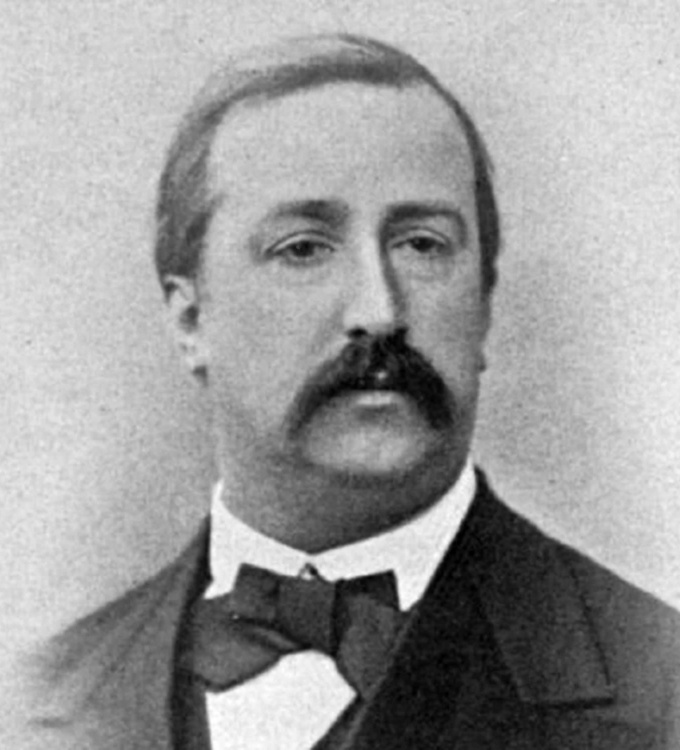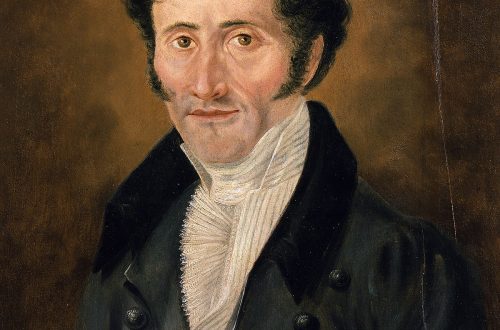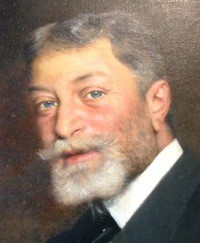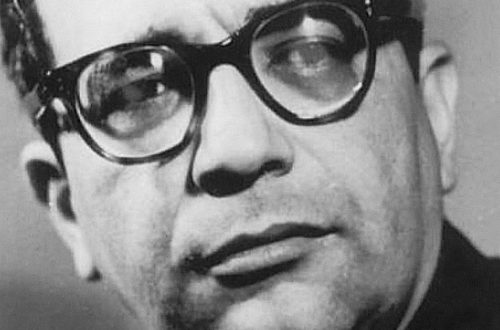
Alexander Porfiryevich Borodin |
Alexander Borodin
Borodin’s music … excites a feeling of strength, vivacity, light; it has a mighty breath, scope, breadth, space; it has a harmonious healthy feeling of life, joy from the consciousness that you live. B. Asafiev
A. Borodin is one of the remarkable representatives of Russian culture of the second half of the XNUMXth century: a brilliant composer, an outstanding chemist, an active public figure, a teacher, a conductor, a music critic, he also showed an outstanding literary talent. However, Borodin entered the history of world culture primarily as a composer. He created not so many works, but they are distinguished by the depth and richness of content, variety of genres, classical harmony of forms. Most of them are connected with the Russian epic, with the story of the heroic deeds of the people. Borodin also has pages of heartfelt, sincere lyrics, jokes and gentle humor are not alien to him. The composer’s musical style is characterized by a wide scope of narration, melodiousness (Borodin had the ability to compose in a folk song style), colorful harmonies, and active dynamic aspiration. Continuing the traditions of M Glinka, in particular his opera “Ruslan and Lyudmila”, Borodin created the Russian epic symphony, and also approved the type of Russian epic opera.
Borodin was born from the unofficial marriage of Prince L. Gedianov and the Russian bourgeois A. Antonova. He received his surname and patronymic from the courtyard man Gedianov – Porfiry Ivanovich Borodin, whose son he was recorded.
Thanks to the mind and energy of his mother, the boy received an excellent education at home and already in childhood he showed versatile abilities. His music was especially attractive. He learned to play the flute, piano, cello, listened with interest to symphonic works, independently studied classical musical literature, having replayed all the symphonies of L. Beethoven, I. Haydn, F. Mendelssohn with his friend Misha Shchiglev. He also showed a talent for composing early. His first experiments were the polka “Helene” for piano, the Flute Concerto, the Trio for two violins and cello on themes from the opera “Robert the Devil” by J. Meyerbeer (4). In the same years, Borodin developed a passion for chemistry. Telling V. Stasov about his friendship with Sasha Borodin, M. Shchiglev recalled that “not only his own room, but almost the whole apartment was filled with jars, retorts and all kinds of chemical drugs. Everywhere on the windows stood jars with a variety of crystalline solutions. Relatives noted that since childhood, Sasha was always busy with something.
In 1850, Borodin successfully passed the exam for the Medico-Surgical (since 1881 Military Medical) Academy in St. Petersburg and enthusiastically devoted himself to medicine, natural science, and especially chemistry. Communication with the outstanding advanced Russian scientist N. Zinin, who brilliantly taught a course in chemistry at the academy, conducted individual practical classes in the laboratory and saw his successor in the talented young man, had a great influence on the formation of Borodin’s personality. Sasha was also fond of literature, he especially loved the works of A. Pushkin, M. Lermontov, N. Gogol, the works of V. Belinsky, read philosophical articles in magazines. Free time from the academy was devoted to music. Borodin often attended musical meetings, where romances by A. Gurilev, A. Varlamov, K. Vilboa, Russian folk songs, arias from then fashionable Italian operas were performed; he constantly visited the quartet evenings with the amateur musician I. Gavrushkevich, often participating as a cellist in the performance of chamber instrumental music. In the same years, he became acquainted with the works of Glinka. Brilliant, deeply national music captured and captivated the young man, and since then he has become a loyal admirer and follower of the great composer. All this encourages him to be creative. Borodin works a lot on his own to master the composer’s technique, writes vocal compositions in the spirit of urban everyday romance (“What are you early, dawn”; “Listen, girlfriends, to my song”; “The beautiful maiden fell out of love”), as well as several trios for two violins and cello (including on the theme of the Russian folk song “How did I upset you”), string Quintet, etc. In his instrumental works of this time, the influence of samples of Western European music, in particular Mendelssohn, is still noticeable. In 1856, Borodin passed his final exams with flying colours, and in order to pass the compulsory medical practice he was seconded as an intern to the Second Military Land Hospital; in 1858 he successfully defended his dissertation for the degree of doctor of medicine, and a year later he was sent abroad by the academy for scientific improvement.
Borodin settled in Heidelberg, where by that time many young Russian scientists of various specialties had gathered, among whom were D. Mendeleev, I. Sechenov, E. Junge, A. Maikov, S. Eshevsky and others, who became Borodin’s friends and made up the so-called ” Heidelberg Circle. Gathering together, they discussed not only scientific problems, but also issues of socio-political life, news of literature and art; Kolokol and Sovremennik were read here, the ideas of A. Herzen, N. Chernyshevsky, V. Belinsky, N. Dobrolyubov were heard here.
Borodin is intensively engaged in science. During 3 years of his stay abroad, he performed 8 original chemical works, which brought him wide popularity. He uses every opportunity to travel around Europe. The young scientist got acquainted with the life and culture of the peoples of Germany, Italy, France and Switzerland. But music has always accompanied him. He still enthusiastically played music in home circles and did not miss the opportunity to attend symphony concerts, opera houses, thus becoming acquainted with many works by contemporary Western European composers – K. M. Weber, R. Wagner, F. Liszt, G. Berlioz . In 1861, in Heidelberg, Borodin met his future wife, E. Protopopova, a talented pianist and connoisseur of Russian folk songs, who passionately promoted the music of F. Chopin and R. Schumann. New musical impressions stimulate Borodin’s creativity, help him realize himself as a Russian composer. He persistently searches for his own ways, his images and musical expressive means in music, composing chamber-instrumental ensembles. In the best of them – the piano Quintet in C minor (1862) – one can already feel both epic power and melodiousness, and a bright national color. This work, as it were, sums up the previous artistic development of Borodin.
In the autumn of 1862 he returned to Russia, was elected a professor at the Medico-Surgical Academy, where he lectured and conducted practical classes with students until the end of his life; from 1863 he also taught for some time at the Forest Academy. He also began new chemical research.
Shortly after returning to his homeland, in the house of the academy professor S. Botkin, Borodin met M. Balakirev, who, with his characteristic insight, immediately appreciated Borodin’s composing talent and told the young scientist that music was his true vocation. Borodin is a member of the circle, which, in addition to Balakirev, included C. Cui, M. Mussorgsky, N. Rimsky-Korsakov and art critic V. Stasov. Thus, the formation of the creative community of Russian composers, known in the history of music under the name “The Mighty Handful”, was completed. Under the direction of Balakirev, Borodin proceeds to create the First Symphony. Completed in 1867, it was successfully performed on January 4, 1869 at the RMS concert in St. Petersburg conducted by Balakirev. In this work, the creative image of Borodin was finally determined – a heroic scope, energy, classical harmony of form, brightness, freshness of melodies, richness of colors, originality of images. The appearance of this symphony marked the onset of the composer’s creative maturity and the birth of a new trend in Russian symphonic music.
In the second half of the 60s. Borodin creates a number of romances very different in subject matter and the nature of the musical embodiment – “The Sleeping Princess”, “Song of the Dark Forest”, “The Sea Princess”, “False Note”, “My Songs Are Full of Poison”, “Sea”. Most of them are written in their own text.
At the end of the 60s. Borodin began composing the Second Symphony and the opera Prince Igor. Stasov offered Borodin a wonderful monument of ancient Russian literature, The Tale of Igor’s Campaign, as the plot of the opera. “I absolutely love this story. Will it be only within our power? .. “I’ll try,” Borodin answered Stasov. The patriotic idea of the Lay and its folk spirit were especially close to Borodin. The plot of the opera perfectly matched the peculiarities of his talent, his penchant for broad generalizations, epic images and his interest in the East. The opera was created on genuine historical material, and it was very important for Borodin to achieve the creation of true, truthful characters. He studies many sources related to the “Word” and that era. These are chronicles, and historical stories, studies about the “Word”, Russian epic songs, oriental tunes. Borodin wrote the libretto for the opera himself.
However, writing progressed slowly. The main reason is the employment of scientific, pedagogical and social activities. He was among the initiators and founders of the Russian Chemical Society, worked in the Society of Russian Doctors, in the Society for the Protection of Public Health, took part in the publication of the magazine “Knowledge”, was a member of the directors of the RMO, participated in the work of the St. Medical-Surgical Academy student choir and orchestra.
In 1872, the Higher Women’s Medical Courses were opened in St. Petersburg. Borodin was one of the organizers and teachers of this first higher educational institution for women, he gave him a lot of time and effort. The composition of the Second Symphony was completed only in 1876. The symphony was created in parallel with the opera “Prince Igor” and is very close to it in ideological content, the nature of musical images. In the music of the symphony, Borodin achieves bright colorfulness, concreteness of musical images. According to Stasov, he wanted to draw a collection of Russian heroes at 1 o’clock, in Andante (3 o’clock) – the figure of Bayan, in the finale – the scene of the heroic feast. The name “Bogatyrskaya”, given to the symphony by Stasov, was firmly entrenched in it. The symphony was first performed at the RMS concert in St. Petersburg on February 26, 1877, conducted by E. Napravnik.
In the late 70s – early 80s. Borodin creates 2 string quartets, becoming, along with P. Tchaikovsky, the founder of Russian classical chamber instrumental music. Particularly popular was the Second Quartet, whose music with great force and passion conveys the rich world of emotional experiences, exposing the bright lyrical side of Borodin’s talent.
However, the main concern was the opera. Despite being very busy with all sorts of duties and implementing the ideas of other compositions, Prince Igor was at the center of the composer’s creative interests. During the 70s. a number of fundamental scenes were created, some of which were performed in concerts of the Free Music School conducted by Rimsky-Korsakov and found a warm response from the audience. The performance of the music of Polovtsian dances with a choir, choirs (“Glory”, etc.), as well as solo numbers (song of Vladimir Galitsky, Vladimir Igorevich’s cavatina, Konchak’s aria, Yaroslavna’s Lament) made a great impression. Much was accomplished in the late 70s and early 80s. Friends were looking forward to the completion of work on the opera and did their best to contribute to this.
In the early 80s. Borodin wrote a symphonic score “In Central Asia”, several new numbers for the opera and a number of romances, among which the elegy on Art. A. Pushkin “For the shores of the distant homeland.” In the last years of his life, he worked on the Third Symphony (unfortunately, unfinished), wrote the Petite Suite and Scherzo for piano, and also continued to work on the opera.
Changes in the socio-political situation in Russia in the 80s. – the onset of the most severe reaction, the persecution of advanced culture, the rampant rude bureaucratic arbitrariness, the closure of women’s medical courses – had an overwhelming effect on the composer. It became more and more difficult to fight the reactionaries in the academy, employment increased, and health began to fail. Borodin and the death of people close to him, Zinin, Mussorgsky, experienced a hard time. At the same time, communication with young people – students and colleagues – brought him great joy; the circle of musical acquaintances also expanded significantly: he willingly attends “Belyaev Fridays”, gets to know A. Glazunov, A. Lyadov and other young musicians closely. He was greatly impressed by his meetings with F. Liszt (1877, 1881, 1885), who highly appreciated Borodin’s work and promoted his works.
From the beginning of the 80s. the fame of Borodin the composer is growing. His works are performed more and more often and are recognized not only in Russia, but also abroad: in Germany, Austria, France, Norway, and America. His works had a triumphant success in Belgium (1885, 1886). He became one of the most famous and popular Russian composers in Europe in the late XNUMXth and early XNUMXth centuries.
Immediately after Borodin’s sudden death, Rimsky-Korsakov and Glazunov decided to prepare his unfinished works for publication. They completed work on the opera: Glazunov recreated the overture from memory (as planned by Borodin) and composed the music for Act III based on the author’s sketches, Rimsky-Korsakov instrumented most of the opera’s numbers. October 23, 1890 Prince Igor was staged at the Mariinsky Theater. The performance received a warm welcome from the audience. “Opera Igor is in many ways a true sister of Glinka’s great opera Ruslan,” wrote Stasov. – “it has the same power of epic poetry, the same grandiosity of folk scenes and paintings, the same amazing painting of characters and personalities, the same colossality of the whole appearance and, finally, such folk comedy (Skula and Eroshka) that surpasses even Farlaf’s comedy” .
Borodin’s work had a huge impact on many generations of Russian and foreign composers (including Glazunov, Lyadov, S. Prokofiev, Yu. Shaporin, K. Debussy, M. Ravel, and others). It is the pride of Russian classical music.
A. Kuznetsova
- The life of Borodin’s music →





